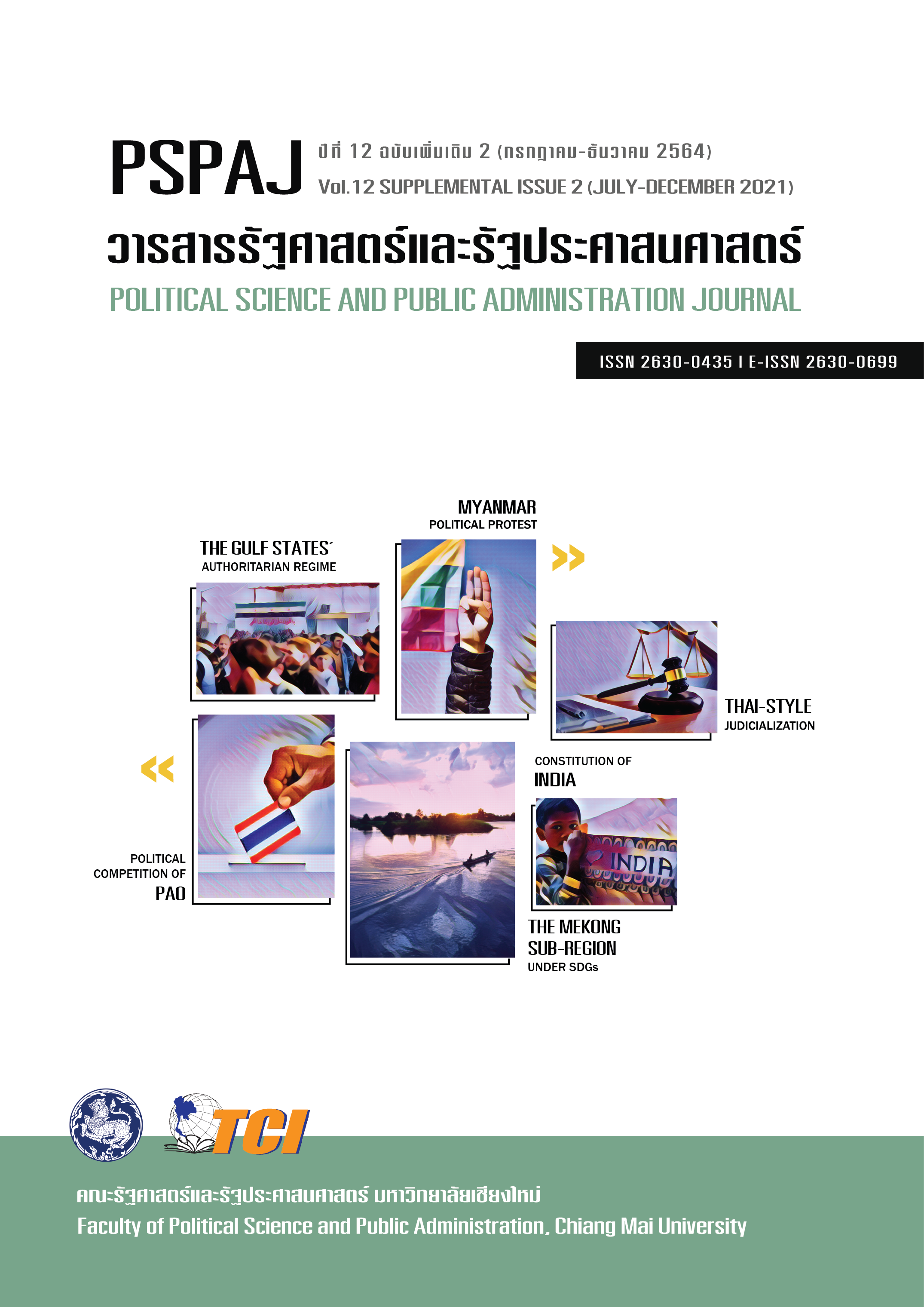Fundamental Rights in the Constitution of India: A Brief Survey
Main Article Content
Abstract
This study preliminarily explores the six fundamental rights stipulated in Part III from Article 12 to 35 of the Constitution of India, including the right to equality, the right to freedom, the right against exploitation, the right to freedom of religion, the right to cultural and educational rights, and the right to constitutional remedies. Data were collected through qualitative methods and analyzed by documentary analysis. The study is found that the fundamental rights are justiciable when violated. The Supreme Court is responsible for protecting and defending the fundamental rights of the people as they are endorsed and protected by the Constitution, while other legal rights are endorsed and protected by ordinary laws. Nevertheless, fundamental rights are not absolute rights because the state could discretionarily impose restrictions on the rights when necessary. Due to their justiciability, the provisions of Part III differ from others in the Constitution. Assumingly, making the fundamental rights justiciable could have been justified as providing a theoretical and practical guarantee of rights and freedom to the people, and this perceived preservation of justice, liberty, equality, and solidarity, the principles that the state adheres to in governing its citizens.
Downloads
Article Details
- เนื้อหาและข้อมูลที่ลงตีพิมพ์ในวารสารรัฐศาสตร์และรัฐประศาสนศาสตร์ถือเป็นข้อคิดเห็นและความรับผิดชอบของผู้เขียนบทความโดยตรง ซึ่งกองบรรณาธิการวารสารรัฐศาสตร์และรัฐประศาสนศาสตร์ ไม่จำเป็นต้องเห็นด้วย หรือร่วมรับผิดชอบใดๆ
- บทความและข้อมูล ที่ได้รับการตีพิมพ์ในวารสารรัฐศาสตร์และรัฐประศาสนศาสตร์ ถือเป็นลิขสิทธิ์ของวารสาร หากบุคคลหรือหน่วยงานใดต้องการนำข้อมูลไปใช้ประโยชน์ในทางวิชาการ ขอให้อ้างอิงแหล่งที่มาด้วย
References
ชนฐิตา ไกรศรีกุล. (2562). ยกเลิก ม.370: เกิดอะไรขึ้นที่อินเดีย เมื่อจัมมู-แคชเมียร์สูญเสียสิทธิพิเศษและอำนาจปกครองตนเอง. สืบค้นเมื่อ 2 พฤษภาคม 2564, จาก https://waymagazine.org/act370-jammu-and-kashmir/
บีบีซีไทย. (2560ก). ราม ณัฐ โกวินทร์: จากจัณฑาลสู่ประธานาธิบดีอินเดียคนล่าสุด. สืบค้นเมื่อ 5 กุมภาพันธ์ 2564, จาก https://www.bbc.com/thai/international-40732121
______. (2560ข). ศาลอินเดียชี้ขาด ข้อมูลส่วนตัวเป็นสิทธิพื้นฐานของประชาชน. สืบค้นเมื่อ 2 พฤษภาคม 2564, จาก https://www.bbc.com/thai/international-41036122
ปิยณัฐ สร้อยคำ. (2556). ระบบโควตาสำรองและสิทธิพลเมืองชายขอบของอินเดีย: ทบทวน ท้าทาย และการปรับใช้ในประเทศไทย.ใน การประชุมวิชาการรัฐศาสตร์และรัฐประศาสนศาสตร์แห่งชาติ ครั้งที่ 14 (น. 1356-1369). อุบลราชธานี: สำนักงานคณะกรรมการวิจัยแห่งชาติร่วมกับคณะรัฐศาสตร์ มหาวิทยาลัยอุบลราชธานี.
สมหวัง แก้วสุฟอง. (2561). การดำรงอยู่ของระบบวรรณะในสังคมอินเดีย. วารสารปณิธาน, 14(1), 115-134.
Bakshi, P. M. (2009). The Constitution of India. New Delhi: Universal Law Publishing.
Dutta, P. K. (2020). Internet Access a Fundamental Right, Supreme Court Makes It Official: Article 19 explained. Retrieved May 4, 2021, from www.indiatoday.in/news-analysis/story/internet-access-fundamental-right-supreme-court-makes-official-article-19-explained-1635662-2020-01-10
Government of India. (2020). 70 Years of Indian Constitution. Retrieved March 1, 2021, from https://static.pib.gov.in/WriteReadData/ebooklat/Flip-Book/constfiles/index.html#p=50
______. (2021). The Constitution of India. Retrieved February 25, 2021, from https://www.india.gov.in/my-government/constitution-india
Jain, M. P. (2000). The Supreme Court and Fundamental Rights. In Verma, S. K., & Kusum (Eds). Fifty Years of the Supreme Court of India: Its Grasp and Reach (pp. 1-100). New Delhi: Indian Law Institute.
Mehta, U. S. (2010). Constitutionalism. In Jayal, N. G., & Mehta, P. B. (Eds). The Oxford Companion to Politics in India (pp. 15-27). New Delhi: Oxford University Press.
National Council of Educational Research and Training. (2015). Textbooks PDF (I-XII). Retrieved February 10, 2021, from https://ncert.nic.in/ncerts/l/keps202.pdf
Parliament of India. (2021). Constituent Assembly Membership. Retrieved April 30, 2021, from https://rajyasabha.nic.in/rsnew/constituent_assembly/constituent_assembly_mem.asp
The Constitution of India. (2021). Constitution of India. Retrieved February 7, 2021, from https://www.constitutionofindia.net/constitution_of_india
The Right to Education. (2013). About. Retrieved February 5, 2021, from http://righttoeducation.in/know-your-rte/about
UNICEF. (n.d.). unicef. Retrieved February 7, 2021, from www.unicef.org/india/what-we-do/child-labour-exploitation


